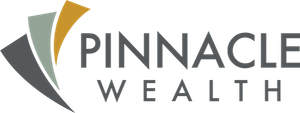Written by Casey Franken, CFP, Wealth Advisor
Whew.
Another tax season is behind us as most individuals have either filed their tax returns or filed for an extension by the new IRS deadline of May 17. Though we’re not accountants, we know how chaotic this time of year can be for people.
If you’re like most, you probably handled a plethora of phone calls with your accountant or tax preparer as the deadline suddenly approached. Perhaps a few of these calls involved “mini epiphanies” of something you could have done months prior to reduce your tax bill.
Our team at Pinnacle Wealth practices proactiveness over reactiveness. In this article, I will introduce the clear distinction between tax planning and tax preparation and how the former can save you significant sums of money come tax time.
All it takes is a little forward thinking.
What is “tax planning”?
Think of tax planning as a look into the future. You know you have a tax bill coming, and you want to make sure you maximize all the opportunities the government offers in order to lower that tax bill.
Tax preparation, on the other hand, is historical. It looks into the past and seeks to make the most of what’s already occurred regarding your financial picture.
A good tax preparer will know the right questions to ask to maximize those credits and deductions, whereas a good tax planner will already know your situation well and help you take advantage of tax-saving strategies otherwise unheard of.
As a quick example to better paint this picture, consider a Roth conversion (converting a traditional IRA into a Roth IRA), which must be completed by December 31. If you wait until the tax filing window the following year, it will be too late to take advantage of this long-term strategy.
Is tax planning only for the ultra-rich?
No. Proactive tax planning applies to anyone who files a tax return.
While there are some unique strategies available only to those with top-tier
incomes, most strategies apply to lower- and middle-class income earners as well.
Some of these services include:
● Establishing retirement plans
● Roth conversions
● Charitable giving strategies
● Health Savings Accounts (HSA)
● Pre-paying property taxes
● Employer withholding amounts
● Education tax credits
● Medicare Part B/D premium planning
● Tax loss harvesting or realizing gains
Additionally, you are at a significant advantage if you are self employed or hold an interest in a pass through entity. There are several retirement plans available to self-employed individuals, including a Solo-401k, SIMPLE IRA, SEP-IRA, and an ESOP. Certain plans can reduce self-employment taxes along with federal income taxes.
Does Pinnacle Wealth help their clients with tax planning?
Absolutely, and we strongly encourage each of our clients to employ their available strategies.
The difficult thing for individuals seeking to maximize their tax savings is that they are not well versed in the tax code, which is constantly updated. You don’t know what you don’t know, which is why a proactive, professional tax planner and wealth advisor will simultaneously relieve headaches and help you retain more of your income.
Each of our advisors at Pinnacle Wealth are well versed in the tax code and continually follow tax law changes. We have three Certified Financial Planners on staff, each of whom has elevated knowledge of tax planning strategies.
While we are not licensed to offer tax advice, we are able to provide suggestions on strategies to be reviewed with a client’s CPA. Fortunately, we have many relationships with CPAs throughout the Sioux Empire region. If a client is in search of a CPA or feels they are underserved by their existing accountant, we are happy to connect them with a suitable fit.
Conclusion
Here’s the reality: Most people have tax-saving strategies available to them that they are not taking advantage of.
But the good news is that professional services exist to capitalize on these missed opportunities. Our firm does not charge for tax planning services and will gladly provide a tax report for anybody who shares their prior returns.
For an example of what this looks like, download a complimentary sample report here.
In addition to this complimentary report, any of our advisors welcome the chance to sit down with anyone looking to better plan their taxes and grow their wealth. If you’d like to explore ways in which you can take control of your finances, I encourage you to call our office and set up a coffee meeting with one of our advisors.
Proactively planning for tax season is only one of the many ingredients for a successful wealth-building plan. But doing so can mean big differences in your family’s wealth in the long run.
Converting from a traditional IRA to a Roth IRA is a taxable event.


